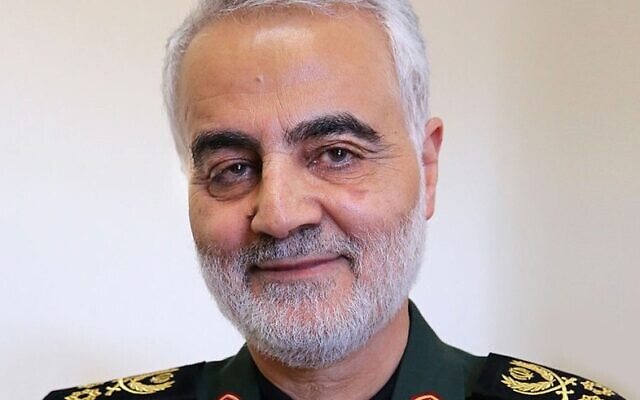Iran vows ‘harsh retaliation’ after US airstrike kills top general
Head of Iran's elite Quds Force, General Qassem Soleimani, was seen as architect of interventions across the region, including to southern Lebanon near Israel's border
Iran’s Supreme Leader Ayatollah Ali Khamenei has vowed “severe revenge” after the country’s most senior soldier was killed in a US airstrike in Iraq.
The revered General Qassem Suleimani, 62, who was predicted to take over as the country’s next president, was killed in a drone strike in Baghdad ordered by US President Donald Trump in the early hours of Friday morning.
Israeli Prime Minister Benjamin Netanyahu cut short a visit to Greece to return to Jerusalem to coordinate any defensive actions necessary, as the world held its breath over the expected Iranian reaction.
Suleimani was no typical general. He led the Quds Force, the expeditionary unit of the elite Islamic Revolutionary Guards Corps (IRGC), which is active on the front lines of all the Arab world’s conflicts, including Iraq, Syria, Yemen and Lebanon.
His soldiers set up forward-operating bases not far from the Golan Heights, which have been repeatedly targeted by airstrikes attributed by analysts to Israel, but such was his influence in Syria that US intelligence reported that he was “running the Syrian civil war all on his own”.
He was the second most powerful person in Iran after Khamenei and drove Iran’s strategy of arming militias such as Hezbollah to Israel’s north. US generals recently called him “the most powerful and unconstrained actor in the Middle East today”.
Among Suleimani’s more recent projects was providing Quds Force assistance to Hezbollah to help the Lebanon-based militia convert some long-range rockets into precision-guided missiles by fitting them with special GPS components, giving them an improved accuracy to within 10 metres – a huge advance.
Alongside Suleimani, the deputy commander of an Iran-backed Iraqi militia was also killed in the early hours attack, when a missile struck their car as it was being driven to the airport.
Iranian president Hassan Rouhani said Arab countries “will take his revenge” while foreign minister Mohammad Javad Zarif said the US was guilty of “international terrorism,” adding that Suleimani’s troops had been “the most effective force fighting Daesh (ISIS), Al Nusrah, Al Qaeda et al”.
In a rare televised interview with Suleimani last year he described how both he and Hezbollah leader Hassan Nasrallah were almost killed by an Israeli air strike 13 years earlier, during hostilities in 2006.
The US has also had opportunities to kill Suleimani before. In 2007, American General Stanley McChrystal was leading elite US troops in Iraq and losing men to roadside bombs made by the Quds Force.
McChrystal called his opposite number “a ghostly puppet master, relying on quiet cleverness and grit to bolster Iran’s international influence” who displayed “brilliance, effectiveness and a commitment to his country”.
The American general recalled how there had been both the opportunity and the reason to kill him in 2007, but chose to monitor his convoy rather than attack it “to avoid a firefight and the contentious politics that would follow”.
Iran sees Suleimani’s killing as “an act of war” by the US and world markets appear to fear the worst, the price of oil rocketing four percent in the hours after the strike.
Russia said Suleimani’s killing amounted to “murder” and denounced it as a “reckless step” while Hezbollah said his death would be “avenged”.

Thank you for helping to make Jewish News the leading source of news and opinion for the UK Jewish community. Today we're asking for your invaluable help to continue putting our community first in everything we do.
For as little as £5 a month you can help sustain the vital work we do in celebrating and standing up for Jewish life in Britain.
Jewish News holds our community together and keeps us connected. Like a synagogue, it’s where people turn to feel part of something bigger. It also proudly shows the rest of Britain the vibrancy and rich culture of modern Jewish life.
You can make a quick and easy one-off or monthly contribution of £5, £10, £20 or any other sum you’re comfortable with.
100% of your donation will help us continue celebrating our community, in all its dynamic diversity...
Engaging
Being a community platform means so much more than producing a newspaper and website. One of our proudest roles is media partnering with our invaluable charities to amplify the outstanding work they do to help us all.
Celebrating
There’s no shortage of oys in the world but Jewish News takes every opportunity to celebrate the joys too, through projects like Night of Heroes, 40 Under 40 and other compelling countdowns that make the community kvell with pride.
Pioneering
In the first collaboration between media outlets from different faiths, Jewish News worked with British Muslim TV and Church Times to produce a list of young activists leading the way on interfaith understanding.
Campaigning
Royal Mail issued a stamp honouring Holocaust hero Sir Nicholas Winton after a Jewish News campaign attracted more than 100,000 backers. Jewish Newsalso produces special editions of the paper highlighting pressing issues including mental health and Holocaust remembrance.
Easy access
In an age when news is readily accessible, Jewish News provides high-quality content free online and offline, removing any financial barriers to connecting people.
Voice of our community to wider society
The Jewish News team regularly appears on TV, radio and on the pages of the national press to comment on stories about the Jewish community. Easy access to the paper on the streets of London also means Jewish News provides an invaluable window into the community for the country at large.
We hope you agree all this is worth preserving.






















